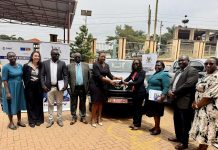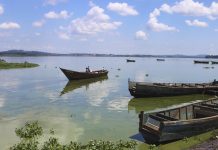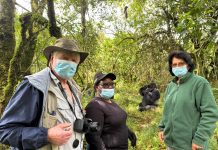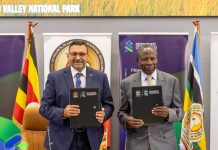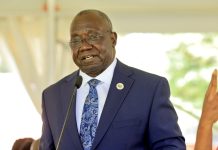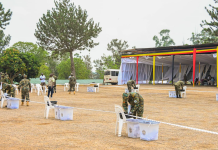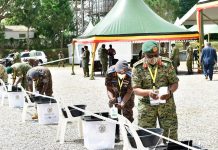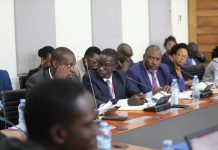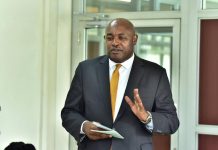By Samuel Ssenono
The Kampala Capital City Authority (KCCA) has released a detailed update on its performance during the 2024/2025 financial year, highlighting major milestones in urban transformation, while laying out priorities and challenges for the year ahead.
Speaking at the Uganda Media Centre, KCCA Executive Director Sharifah Buzeki described the past year as “a period of bold action, decisive leadership, and unwavering commitment to transforming Kampala into a livable, modern, and inclusive city.”

Waste Management Takes Center Stage
One of the most significant developments is the progress toward decommissioning the long-overburdened Kiteezi landfill. With a $1 million grant from the Japanese government through UN-Habitat, KCCA began stabilizing seven acres of the landfill, focusing on gas emissions, leachate management, and drainage.
Meanwhile, the Authority has secured a 230-hectare site in Buyala, Mpigi for a new Integrated Waste Management and Resource Recovery Facility, which is expected to redefine Kampala’s waste handling infrastructure.
Community clean-ups, public sensitization campaigns, and enforcement against illegal dumping have also been central to KCCA’s waste strategy. More than 4,000 vulnerable residents were contracted under SACCOs to help keep the city clean, with all payments up to date by the end of the fiscal year.

Roads, Connectivity and Drainage Upgrades
Under the Kampala City Roads Rehabilitation Project (KCRRP), over 70 kilometers of roads are undergoing rehabilitation. Several, including Old Mubende, Kabega, and Wamala roads, are completed and awaiting final touches like lighting and road markings. Major bridges such as Kayemba (95% complete) and Nakawa Railway Crossing (90%) are already in use.
In June, ground was broken on 15 roads under Phase I of the Greater Kampala Metropolitan Area Urban Development Program (GKMA-UDP), covering 19.85 kilometers. Roads under this initiative span all five city divisions.
Over the last six months, internal KCCA teams worked on critical roads across Kampala using Government of Uganda funding. These include Erisa, Mawanda, Katonga, and Clement Hill roads.
The coming three years will see UGX 550 billion invested to reconstruct and upgrade 84 kilometers of roads and drainage systems, with M/s Dott Services contracted under a framework agreement. Drainage projects are also underway in flood-prone areas such as Bwaise, Kansanga, and Lubigi, helping to mitigate flooding.
KCCA completed 27 traffic junction signalizations and is removing key roundabouts to ease congestion. The Kampala Traffic Control Center at City Hall is ready, with equipment arriving soon to manage traffic in real time.

Public Infrastructure: Toilets, Schools and Health
Public sanitation has been another focus. KCCA built 59 new public toilets 33 in schools and 26 in public areas and renovated 14 more. Locations include markets, police stations, and schools like Kansanga Primary, Kiteebi, and Police Children Primary School in Kibuli.
School infrastructure has also seen upgrades. Phase II of Nakivubo Primary School’s classroom block is complete. Renovation and asbestos removal have been done at Kololo SS and Kyambogo College School. Construction is pending at Kasubi Family School and Mpererwe P/S, and land has been secured for Bukasa P/S.
The ongoing construction of a maternity ward at Kiswa Health Centre is part of wider efforts to improve health services in the city.
Livelihoods and Inclusion
On livelihoods, the newly commissioned Busega Market is now home to over 2,000 vendors. KCCA has completed vendor registration and zoning in 16 out of 17 city markets. Similar works are progressing at Kiseka and Kitintale markets.
Youth empowerment efforts reached over 600 young people through vocational training at Kabalagala Youth One-Stop Centre. Over 125 graduates received startup kits to support entrepreneurship. Meanwhile, 5,704 youth were mentored and linked to apprenticeships, and 1,142 people trained in urban farming.
Kampala continues to lead in implementing the Parish Development Model. In FY 2024/25 alone, UGX 9.8 billion supported 9,065 beneficiaries across 98 parishes. A total of UGX 29.3 billion has benefited 28,516 households over the past three financial years.

Tackling Urban Vulnerabilities
KCCA rescued 208 street-connected children this year and followed up on 684 others reintegrated into schools in Napak District. These interventions, Buzeki said, are about “rescuing children not just from the streets but from exploitation and lost futures.”
The August 2024 Kiteezi garbage slide displaced 142 households. Compensation and structural assessments are ongoing. Eighteen properties have already been paid out, and valuations for submerged and flood-affected homes are in progress.
Greening the City
KCCA has planted over 8,500 trees across the city, and launched the Urban Forest Management Plan (2023–2029). Beautification of key roads like Nile Avenue and Jinja Road is ongoing, while enforcement against misuse of green spaces is in effect. The city is also expanding air quality monitoring and will continue partnering with schools and the private sector to improve environmental sustainability.
Revenue and Compliance
KCCA collected UGX 127.6 billion in FY 2024/25, surpassing its UGX 120.4 billion target. The goal for FY 2025/26 is UGX 132.4 billion. Over 29,000 new taxpayers were registered, and 148 community engagements held to drive voluntary compliance.
Priorities for FY 2025/26
Looking ahead, KCCA’s top priorities include:
* Completing ongoing KCRRP roadworks, including Salama, Sir Apollo Kaggwa, Portbell, and Industrial Area roads.
* Signalizing 22 more traffic junctions.
* Completing 15 roads under GKMA-UDP.
* Operationalizing the Buyala landfill with weighbridges, access roads, and gas capture systems.
* Maintaining and constructing drainage channels in flood-prone areas.
* Completing the Kiswa Health Centre maternity ward.
* Constructing Ggaba and Usafi markets.
* Scaling air quality initiatives and climate adaptation.
* Upgrading more schools and providing desks to 10 schools.
Challenges Ahead
Buzeki acknowledged the roadblocks ahead. Key among them is funding particularly for 100 garbage trucks and 10 new ambulances. Wetland encroachment and illegal dumping also remain persistent issues.
Despite this, she remains optimistic. “We will not slow down,” she said. “Through partnerships, planning, and collective action, we will build the Kampala we all deserve.”

Civic Appeal and Festival Return
With the country heading into an election year, KCCA is calling for responsible civic behavior. Political activities in public service areas like markets and health facilities have been discouraged. Official guidelines on campaign materials have been issued.
Finally, Buzeki announced the return of the Kampala City Festival. Set to launch on August 6 at City Hall, the full event date will be confirmed then. “This is not just about celebration. It is about unity, pride, and reaffirming our shared goal of a clean, modern Kampala,” she said.
KCCA also extended appreciation to President Yoweri Museveni, the Ministry for Kampala Capital City and Metropolitan Affairs, and all staff and partners who supported the city’s transformation over the past year.



